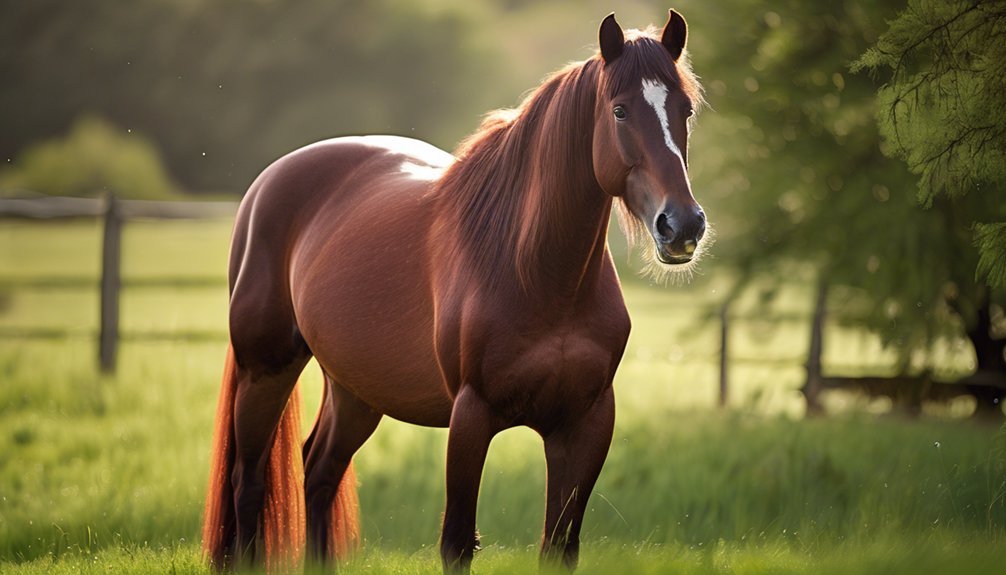
Greasiness in horse coats can be a frustrating issue that impacts the overall appearance and health of your horse. It's essential to understand the various factors contributing to this condition, from diet to grooming practices. By implementing a structured routine and assessing your horse's nutritional needs, you can effectively manage oil buildup. What steps should you take to ensure optimal coat health? Let's explore the best strategies to tackle this common concern.
Key Takeaways
- Maintain a balanced diet rich in high-quality forage and adequate protein to support coat health and reduce greasiness.
- Implement a consistent grooming routine, brushing daily to remove excess oil, dirt, and loose hair.
- Choose appropriate grooming tools, including stiff and soft brushes, rubber curry combs, and non-greasy conditioners for effective grooming.
- Bathe your horse with a quality degreasing shampoo, focusing on greasy areas and rinsing thoroughly to remove residue.
- Monitor and manage stress and hormonal changes, as these factors can trigger overactivity of sebaceous glands leading to greasiness.
Understanding the Causes of Greasiness
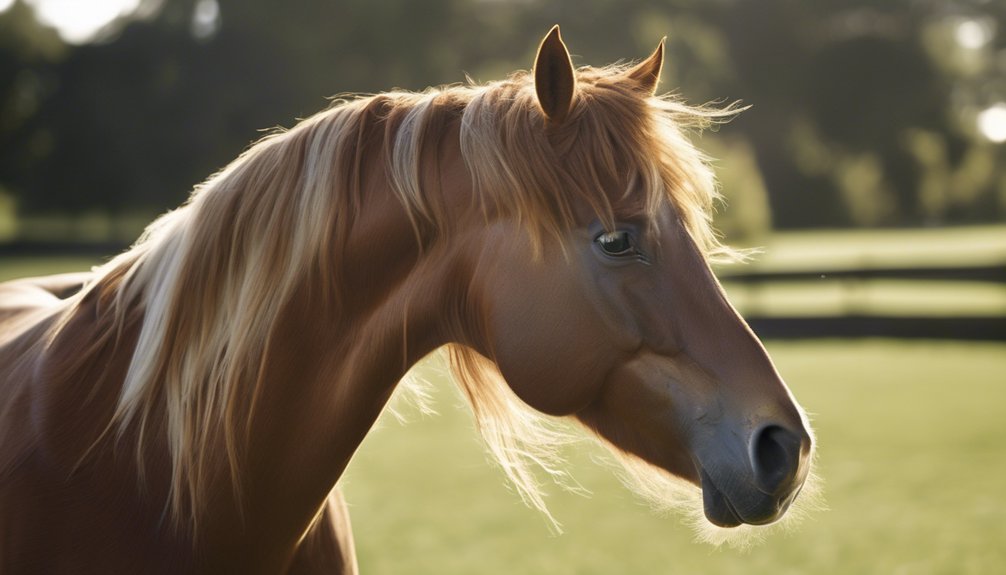
Understanding the causes of greasiness in horse coats is essential for effective management and care. Various factors contribute to this condition, notably glandular activity.
Horses have sebaceous glands that secrete oils to protect their skin and coat. When these glands become overactive, it can lead to an excessively greasy coat. Stress, hormonal changes, and environmental factors can trigger this increased activity, making it vital to monitor your horse's condition closely.
Regular coat maintenance, including grooming and bathing, helps manage the greasiness. By ensuring you're using appropriate grooming techniques and products, you can maintain a healthy balance in your horse's coat.
Addressing these underlying causes will promote not just a shiny coat but also overall skin health and comfort for your horse.
Evaluating Your Horse's Diet
When evaluating your horse's diet, it's crucial to consider how nutritional balance affects coat health and greasiness. A well-rounded diet can help minimize excessive oiliness, improving your horse's overall appearance and comfort.
Here are key areas to assess:
- Quality of forage: Ensure high-quality hay or pasture is available.
- Protein sources: Include adequate protein for coat structure and health.
- Fat content: Balance omega-3 and omega-6 fatty acids for optimal skin condition.
- Vitamins and minerals: Pay attention to deficiencies that might contribute to greasiness.
Making dietary adjustments can significantly impact your horse's coat quality, so focus on maintaining a proper nutrient balance for the best results.
Your horse deserves the best care, and diet plays a vital role in that.
Implementing a Consistent Grooming Routine
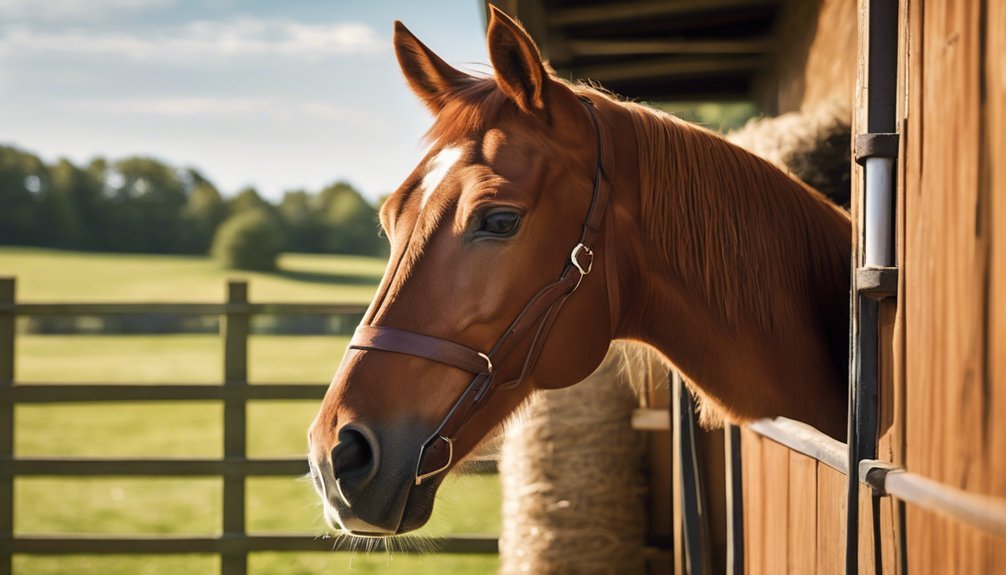
A balanced diet lays the groundwork for a healthy coat, but consistent grooming is key to managing greasiness. Establishing a grooming schedule that you adhere to daily can make a significant difference.
Start by brushing your horse regularly to remove excess oil, dirt, and loose hair. Incorporate specific daily habits, like using a curry comb to loosen debris and a dandy brush to lift away grime.
Pay attention to areas that tend to trap oil, such as the girth and underbelly. Regular grooming not only helps control greasiness but also promotes circulation and strengthens your bond with your horse.
Choosing the Right Grooming Tools
Selecting the right grooming tools is essential for effectively managing greasiness in your horse's coat. Using appropriate tools can make a significant difference in maintaining cleanliness and shine.
Here are some key items you'll want to include in your grooming kit:
- Grooming brushes: Opt for both stiff and soft brushes to remove dirt and distribute natural oils.
- Rubber curry combs: These help loosen dirt and grease while stimulating the skin.
- Coat conditioners: Look for non-greasy options that nourish the coat without adding extra oil.
- Sponges or cloths: Use these for spot cleaning and applying conditioners effectively.
Investing in quality grooming tools not only enhances your horse's appearance but also strengthens your bond during grooming sessions.
Bathing Techniques for Greasy Coats
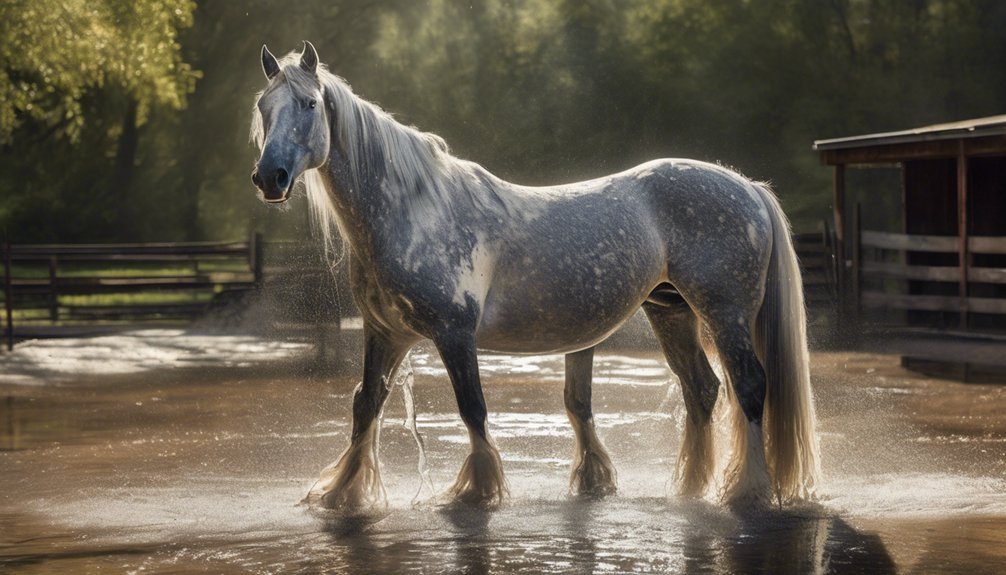
Effective bathing techniques are crucial for managing greasiness in your horse's coat. Start by selecting a quality shampoo specifically designed for greasy coats; look for those with degreasing properties.
Before applying the shampoo, ensure the water temperature is lukewarm. Too hot can irritate your horse's skin, while too cold may not effectively lift grease.
Wet your horse thoroughly, then apply the shampoo, working it into a lather with your hands or a sponge. Focus on areas where grease accumulates, such as the belly and under the mane.
Rinse thoroughly to remove all residue, as leftover shampoo can exacerbate greasiness. Finish with a final rinse in cooler water to help close the hair cuticles, leaving your horse's coat looking shiny and healthy.
Environmental Factors to Consider
After implementing proper bathing techniques, it's important to understand how environmental factors can influence the greasiness of your horse's coat.
Weather conditions and humidity levels play a critical role in coat health. Here are some factors to consider:
- Seasonal changes: Different seasons bring varying humidity and temperature levels.
- Geographic location: Coastal areas often have higher humidity, affecting oil production.
- Shelter conditions: Poor ventilation can trap moisture and increase greasiness.
- Diet and hydration: Ensure your horse's nutrition supports a healthy coat, as environmental stressors can exacerbate greasiness.
When to Consult a Veterinarian
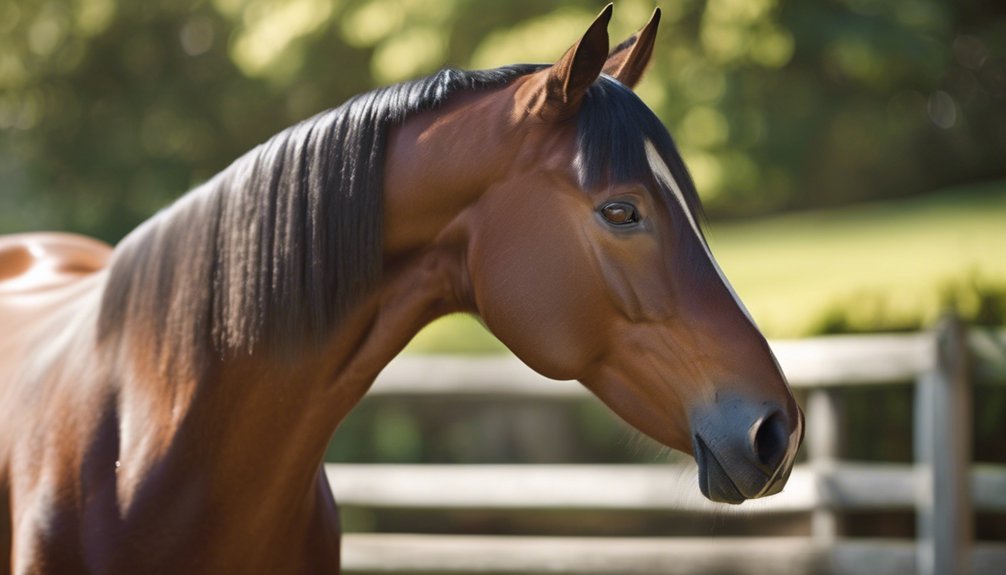
When should you consider consulting a veterinarian about your horse's greasiness? If you notice persistent greasiness that doesn't improve with regular grooming or dietary adjustments, it's essential to seek professional help.
Symptom identification is crucial; look for signs like excessive oiliness, skin irritations, or unusual hair loss. These could indicate underlying issues such as skin infections or metabolic disorders.
If your horse exhibits any additional symptoms, like lethargy or changes in appetite, don't hesitate to reach out. A veterinarian can provide tailored treatment options, ensuring your horse regains a healthy coat.
Frequently Asked Questions
Can Weather Conditions Affect My Horse's Coat Greasiness?
Yes, weather conditions significantly impact your horse's coat greasiness. High humidity levels can increase oil production, while seasonal changes may cause variations in coat texture. Monitoring these factors helps you maintain your horse's coat health effectively.
Are There Specific Breeds Prone to Greasy Coats?
Imagine running your fingers through a horse's thick, glossy coat. Some breeds, like the Arabian or Thoroughbred, may show unique coat textures that are more prone to greasiness, influenced by their distinct breed characteristics and environment.
How Often Should I Bathe a Greasy-Coated Horse?
To maintain your horse's coat effectively, you should bathe them every two to four weeks, depending on their activity level and environmental conditions. Regular bathing frequency promotes healthy coat maintenance and prevents excessive greasiness.
Can Stress Contribute to Coat Greasiness in Horses?
Yes, stress triggers hormonal changes that can affect your horse's coat texture. When horses experience stress, their bodies may produce excess oil, leading to a greasier appearance. Managing stress is crucial for maintaining a healthy coat.
What Home Remedies Can Help Reduce Coat Greasiness?
For coat greasiness, try incorporating oat nutrition into your horse's diet and employing effective grooming techniques. Regular brushing can help distribute natural oils, while adding apple cider vinegar to baths may alleviate excess grease.
Conclusion
In the quest for a lustrous coat, think of your horse as a canvas, needing careful strokes and vibrant colors. By nurturing their diet, maintaining a diligent grooming routine, and employing effective bathing techniques, you can transform that canvas from dull to dazzling. Like a gardener tending to their flowers, your consistent care will cultivate a healthy, gleaming coat. Should shadows of greasiness persist, don't hesitate to seek the insight of a veterinarian to restore the brilliance.





